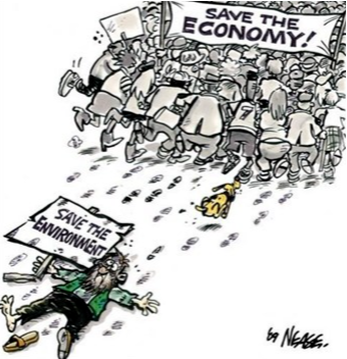|
By: Laurel Kutz  Any time there is talk about climate change and what we can do about it, it seems that the conversation takes a back seat to other, some would say more essential, issues of interest and speculation. Though climate activists keep pushing for changes, environmental legislation is repeatedly ignored as discussion about it and federal funds to provide for it often find their way, instead, to national security and saving the economy. Don’t get me wrong – security and the economy are two important facets of our livelihood, but if we keep disregarding the health of our planet, at some point there won’t be much left to talk about. In a scene in one of my favorite movies, “The Day After Tomorrow”, the main character, paleoclimatologist Jack Hall, is seen warning political leaders of international countries that humans have to be wary about the fragility of the environment, and that the prolonged burning of fossil fuels will contribute to a future ecological collapse. The fictional Vice President of the US interjects that “...our economy is every bit as fragile as the environment. Perhaps you should keep that in mind before making sensationalist claims.”
Even though the events that follow this scene are pieces of fiction, “The Day After Tomorrow” serves as a warning sign to people all over the globe. Fantastical natural disasters occur and countless lives are lost in the wreckage. Dozens of tornadoes devastate Los Angeles, and a wall of water the height of a skyscraper slams into New York City. The final act comprises a massive hurricane style blizzard, with the eye of the storm capable of instantly freezing all living things. The hypothesis of why these horrifying events occurred was the culprit of climate change and global warming. With a warming atmosphere, ice caps of Antarctica and the Arctic broke off and melted in the ocean, critically desalinizing the North Atlantic Current, thus causing major weather catastrophes around the world. This movie serves as a cautionary tale of what happens when we ignore the environment. In our current global capitalist system, ecosystems and natural resources are treated as commodities and are constantly over exploited. Deforestation, industrial and plastic pollution, and the endangerment of species are all issues caused by the emphasis of economic wealth and capital over the well-being of the environment. Moreover, the dependence on fossil fuels such as coal and oil on economic growth is creating a completely unsustainable economy, due to the impending doom of global warming and climate change. While public opinion has grown to prioritize the exploration and development of renewable energy compared to expanding the fossil fuel industry, it is the companies and governments whose decisions make a real impact. What we all need to agree on--individuals, multinational conglomerates, and international governments alike--is that we have endangered the environment and need to prioritize protecting it. All aspects of human life and society depend on the Earth. This seems like a no-brainer, but economic policies and sentiments show that as humans, we think that we are invincible. This is not the case. Everything we have, we owe to Earth. Instead of neglecting the life that builds and sustains us, we need to protect the environment, the provider of all basic necessities that we depend on. I won’t say that the economy isn’t important, because it seems like it is everything nowadays. Everyday on the news, we hear about rising inflation, rising gas prices, and a possible recession looming on the forefront. In our current globalized system, money runs the world. Everything we do is in the pursuit of money because we made it necessary for our survival. But, when it comes down to it, which is more important? In the hypothetical situation where either the economy or the environment collapsed, which would be worse? With the economy, it would wreak havoc on so many lives, but not all would be lost. The world technically wouldn’t end as we knew it, we would just have to rebuild. If the environment collapsed, on the other hand, everything else would soon fall with it. In the end, the world we live in is the most important asset that we have, but we shouldn't treat it as one. We shouldn't act as though we own the environment; rather, we must mutually help each other. The current economic emphasis of continuous and exponential growth fuels the fire of overconsumption and unsustainability. By not putting a price on the environment, we can halt the process of its destruction. https://www.simcoe.com/news/cartoon---nease---environment-vs-economy/article_ab2a1a6b-3ab6-5b05-9e23-bc8df855037a.htmlΩ
1 Comment
Hannah
5/18/2023 10:29:57 am
Loved it!
Reply
Leave a Reply. |
Archives
May 2024
|